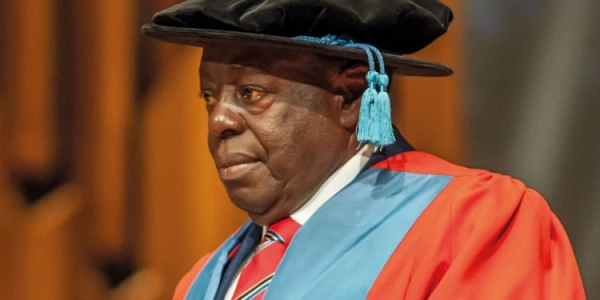Founder and proprietor of Afe Babalola University, Ado-Ekiti, Chief Afe Babalola, has urged the incoming Nigerian Presidential administration to prioritise debt forgiveness from Nigeria’s creditor countries and from multilateral financial institutions.
Afe Babalola disclosed this in a lecture delivered by the University on Sunday, titled, Smart Infrastructure: Catalyst for sustainable development”, alongside a Professor of Intelligent Infrastructure System, Prof. Bamidele Adebisi.
Debt Relief
Afe Babalola stated that debt forgiveness would help Nigeria with its foreign debt obligations, as Nigeria currently uses a sizeable percentage of its revenue on debt servicing.
In his words, Chief Afe said:
- “He also urged the in-coming administration to cut expenditures and undertake reforms that would scale down governance costs and ease the country’s fiscal burden.
Prof. Adebisi also stated that technology had become a game-changer in addressing challenges in the areas of food production and transportation.
- “The importance of technology across all sectors of development, noting that technology had become the catalyst for societal development” he added.
History of debt forgiveness
In 2006, the Paris Club reached an unprecedented arrangement with Nigeria to restructure and write off the entire external debt owed by Nigeria.
In essence, Nigeria paid $18 billion to write off $36.99 billion in external debt, with an initial $6 billion to qualify for debt relief. The relief offered was a write-off of $ 16 billion.
Nigeria then bought back $8.2 billion of the debt at a discount and paid off the final $6 billion, translating to a 60% discount. This was a novel agreement secured by Nigeria, because the Paris Club does not do debt write-offs at a value.

Present foreign debt
According to the Debt Management Office, as of December 31, 2022, the Total Public Debt Stock consisting of the domestic and external total debt stock of the Federal Government, the sub-national governments (36 state governments) and the Federal Capital Territory was N46.25 trillion or USD103.11 billion. The comparative figure for December 31, 2021, was N39.56 trillion or $95.77 billion.
- “In terms of composition, total Domestic Debt Stock was N27.55 trillion (USD 61.42 billion) while Total External Debt Stock was N18.70 trillion (USD 41.69 billion).
- “Amongst the reasons for the increase in the total public debt stock were new borrowings by the FGN and sub-national governments, primarily to fund budget deficits and execute projects. The issuance of promissory notes by the FGN to settle some liabilities also contributed to the growth in the debt stock.
- “On-going efforts by the Government to increase revenues from oil and non-oil sources through initiatives such as the Finance Acts and the Strategic Revenue Mobilization initiative are expected to support debt sustainability.”
Source: Nairametrics


















